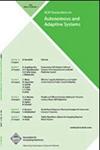Predicting Nonfunctional Requirement Violations in Autonomous Systems
IF 2.2
4区 计算机科学
Q3 COMPUTER SCIENCE, ARTIFICIAL INTELLIGENCE
引用次数: 0
Abstract
Autonomous systems are often used in applications where environmental and internal changes may lead to requirement violations. Adapting to these changes proactively, i.e., before the violations occur, is preferable to recovering from the failures that may be caused by such violations. However, proactive adaptation needs methods for predicting requirement violations timely, accurately and with acceptable overheads. To address this need, we present a method that allows autonomous systems to predict violations of performance, dependability and other nonfunctional requirements, and therefore take preventative measures to avoid or otherwise mitigate them. Our method for pre dicting these autonomou s sys t em disrupti o ns (PRESTO) comprises a design time stage and a run-time stage. At design-time, we use parametric model checking to obtain algebraic expressions that formalise the relationships between the nonfunctional properties of the requirements of interest (e.g., reliability, response time and energy use) and the parameters of the system and its environment. At run-time, we predict future changes in these parameters by applying piece-wise linear regression to online data obtained through monitoring, and we use the algebraic expressions to predict the impact of these changes on the system requirements. We demonstrate the application of PRESTO through simulation in case studies from two different domains.预测自治系统中的非功能需求违反
自治系统通常用于环境和内部变化可能导致需求违反的应用程序中。主动适应这些变化,即,在违规发生之前,比从可能由此类违规引起的失败中恢复更可取。然而,主动适应需要能够及时、准确地预测需求违反并且开销可接受的方法。为了满足这一需求,我们提出了一种方法,该方法允许自治系统预测对性能、可靠性和其他非功能需求的违反,并因此采取预防措施来避免或减轻它们。我们预测这些自主系统的方法(PRESTO)包括一个设计阶段和一个运行阶段。在设计时,我们使用参数模型检查来获得代数表达式,这些表达式形式化了感兴趣需求的非功能属性(例如,可靠性,响应时间和能源使用)与系统及其环境参数之间的关系。在运行时,我们通过对通过监测获得的在线数据应用分段线性回归来预测这些参数的未来变化,并且我们使用代数表达式来预测这些变化对系统需求的影响。我们通过模拟两个不同领域的案例研究来演示PRESTO的应用。
本文章由计算机程序翻译,如有差异,请以英文原文为准。
求助全文
约1分钟内获得全文
求助全文
来源期刊

ACM Transactions on Autonomous and Adaptive Systems
工程技术-计算机:理论方法
CiteScore
4.80
自引率
7.40%
发文量
9
审稿时长
>12 weeks
期刊介绍:
TAAS addresses research on autonomous and adaptive systems being undertaken by an increasingly interdisciplinary research community -- and provides a common platform under which this work can be published and disseminated. TAAS encourages contributions aimed at supporting the understanding, development, and control of such systems and of their behaviors.
TAAS addresses research on autonomous and adaptive systems being undertaken by an increasingly interdisciplinary research community - and provides a common platform under which this work can be published and disseminated. TAAS encourages contributions aimed at supporting the understanding, development, and control of such systems and of their behaviors. Contributions are expected to be based on sound and innovative theoretical models, algorithms, engineering and programming techniques, infrastructures and systems, or technological and application experiences.
 求助内容:
求助内容: 应助结果提醒方式:
应助结果提醒方式:


